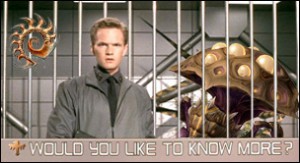
Scientists Warn of Swarm Host Threat
— February 11, 2014ESPORTS scientists have expressed concern at the exponential increase in the length of games caused by the introduction of the Zerg Swarm Host, indicating that the unit is a cause for grave concern.
StarCraft 2 balance designer and head swarmologist David Kim have rushed to quash the claims, insisting that there is no evidence at all that the Swarm Host is any threat and citing that the accelerated game timer may be misleading audiences into erroneously believing game length has been increasing.
However, after the Proleague Finals match between Samsung and SK Telecom, all members of the Blizzard balance team have refused comment, adding fuel to the speculation that there may be a very serious problem.
“We’ve already experienced a three hour Protoss vs Zerg game,” said Professor Chad M.F. Jones of the TPOP Institute. Jones is referring to the October 2013 WCS Challenger match between MaNa and FireCake that lasted 3 hours 4 minutes and 54 seconds. In yet another PvZ Swarm Host match between Snute and Titan, commentators John “TotalBiscuit” Bain and Sean “Day9” Plott resorted to playing jazz music to pass the time.
“And now we’re seeing evidence of Terran vs Zerg Swarm Host battles that go on for more than one game,” Jones continued. “There will come a time when Swarm Host games reach a critical, self sustaining mass. From that point on, they will extend unto forever.”
“If games continue to dilate at the rate they are now, within four years we’ll see a game of Starcraft 2 started that won’t end within either player’s lifetime.” said TPOP research assistant Woo Kyung Chul. “Entire lives will be spent in the booth, with generations of progamers pushing the slumped corpses of their predecessors to the floor.”
With birth rates declining, it’s only a matter of time before all of mankind is similarly enslaved, constantly managing the Swarm Hosts. Moreover, the exponential lengthening of games will not stop there. Research projects that games begun in the year 2017 would stretch endlessly, such that their conclusion would fall some time after the collapse of our local star, meaning that only those players with the foresight to transfer to space-faring colony ships could continue.
Extending the hypothesis even further, games begun in 2020 would need to open with the understanding that the match will likely be curtailed by the gradual heat death of the observable universe, and players will need to transverse time-space in ships with adequate supernova shielding. Fortunately, while all Protoss already are impervious to Supernova, and the MLG Ender’s Game on Blu-ray tournament has provided a film blueprint of how to handle faster-than-light communication in the form of the ansible.
More chilling even than the thought of a Swarm Host game continuing until the end of our solar system is the fear that such a thing might not prove sufficient to stop the game. Given the pace at which mankind has been making technological advancement, there is no guarantee that humanity will not find a way to ensure that these games continue through an induced Big Bang/Big Crunch cycle. By doing so man would only ensure that future, unborn generations are born only to live and die as the average length of Swarm Host games approaches infinity.
Beyond space and time, in the pre-Big Bang singularity, the only constant is a game being played that lasts so long that no one remembers who started it or why. These scientists speculate that, in the infinite depths of space, in the gaping void between the stars, there is one game that has simultaneously not yet begun and is now coming to a close.
“Our observable universe is only somewhere in the region of 14 billion years old,” said Steven Bonnell, scientist at CERN’s Large Hardon Collider. “It’s conceivable that, within ten or fifteen years we’ll see games lasting twice or three times that long. It seems inevitable that we will soon see Swarm Host games last longer than the lifespan of this universe, and well into another.”
